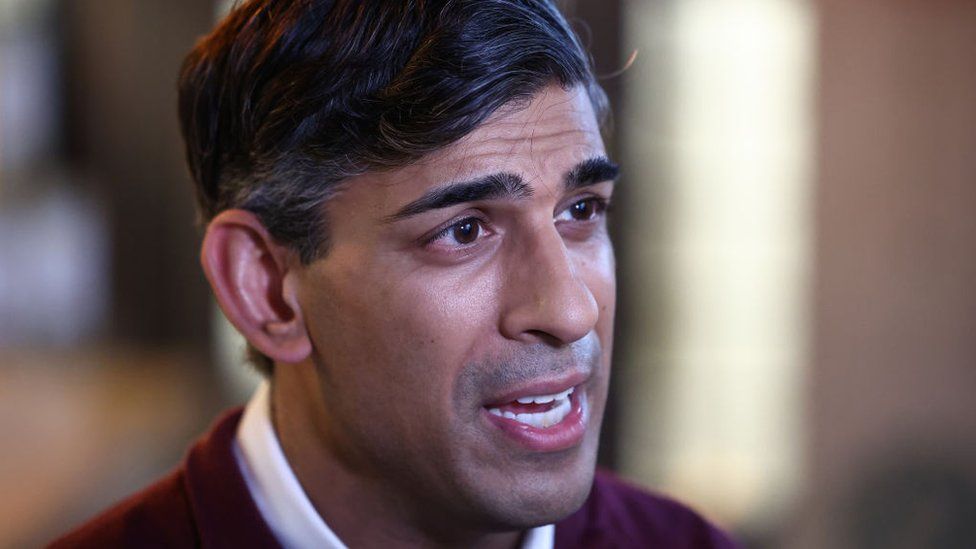
By Becky Morton & Nick Eardley
BBC Politics
Rishi Sunak has said the general election result is “not a foregone conclusion”, despite “a disappointing” set of local elections for the Tories.
Speaking to broadcasters for the first time since the extent of Tory losses were clear, the PM said he was “determined to fight” on.
The party lost 470 council seats, as well as all but one mayoral contests.
The BBC has spoken to a number of Tory MPs who reflected an increasing pessimism in the party.
One senior figure in the party described the next months as “managed decline”, and talked of the Conservatives waiting for their fate.
But there appears to be no prospect of a move against Rishi Sunak in the coming days.
Earlier, Mr Sunak told the Times the local election results “suggest we are heading for a hung parliament with Labour as the largest party” – appearing to concede for the first time that his party could be on course to lose its majority.
“Keir Starmer propped up in Downing Street by the SNP, Liberal Democrats and the Greens would be a disaster for Britain,” he said.
“The country does not need more political horse trading, but action.”
Labour has denied it is planning alliances with other parties in order to form a government at the next general election, which is expected in the second half of this year.
Mr Sunak’s comments reflect analysis by leading psephologist Prof Michael Thrasher for Sky News – which suggested Labour would win 294 seats at a general election.
The projection, which has been dismissed by some polling experts, used the local election results to project a nationwide estimate of vote share at a general election.
It assumes everyone would vote in the same way at a general election as they did in last week’s local elections. However, smaller parties and independent candidates tend to do better in local elections.
It also does not take account of what could happen in Scotland, instead using the results of the 2019 general election, while Labour are expected to do much better there this year.
Challenged over his suggestion there could be a hung Parliament, Mr Sunak said: “The independent analysis shows that whilst of course this was a disappointing weekend for us, that the result of the next general election isn’t a foregone conclusion and indeed actually is closer than, or the situation is closer than, many people are saying – or indeed some of the opinion polls are predicting.
“And that’s why I’m absolutely determined to fight incredibly hard for what I believe and for the future country that I want to build, and that’s what I’m going to do.”
One MP argued talk of hung Parliament was “delusional” and said the Tories would be lucky to win more than 200 seats out of 650 at the general election.
Jeremy Corbyn won 202 seats in Labour’s drubbing in 2019.
Others are more pessimistic and think the number of Tory MPs could be similar to 1997, when John Major returned just 165.
Even among those who think a hung parliament is possible, few are arguing the Conservatives have much chance of being the biggest party.
One former cabinet minister, themselves facing a challenge to keep their seat, said the case to voters would be they should vote Conservative to stop a Labour landslide.
The prime minister’s job in the next few days will be to try and rally his party and persuade them all is not lost.
But as has been the case for some time now, there is still an active debate about what the party should do next.
Former Prime Minister Liz Truss is among those arguing privately that changing the leader would be mad but that the Conservatives need to offer “fundamental reform” – policy, not personnel.
There are figures on the right of the party agitating, and calls for the Conservatives to back leaving the European Convention on Human Rights.
Some want a radical reshuffle or more moves to cut taxes.
Some have suggested finding more wedge issues to highlight differences with Labour on cultural issues.
Home Secretary Suella Braverman is among those urging the prime minister to change course and adopt more right-wing policies, although she argued it would be “impossible” to change leaders so close to a general election.
But those in the centrist One Nation group agree with Andy Street, who lost the West Midlands mayoral contest by just 1,508 votes, that the party should focus on “moderate, inclusive, tolerant Conservatism”.
Talk of tacking to the right is “barmy”, said one MP.
“They are in a minority.”








